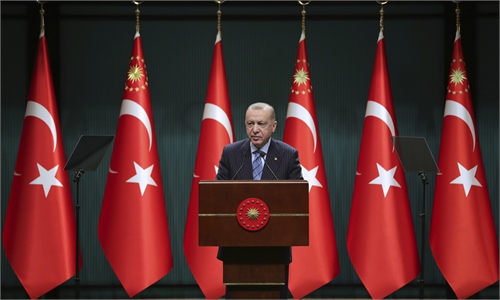
Photo: IC
Editor's Note:Lithuania's recent withdrawal from the 17+1 cooperation mechanism between China and the Central and Eastern European countries (CEEC) sparked speculation over whether other European members will follow suit. But George Katrougalos (Katrougalos), former foreign minister of Greece, dismissed this idea. He emphasized that "multilateralism, mutual economic gains and shared prosperity" are the most important reasons that made Greece and other European countries join the initiative in the first place and those reasons are still "very much pertinent" today. As US President Joe Biden embarks on his Europe tour, one of whose aims is believed to rally allies against China, Katrougalos said he fully support the idea of "European sovereignty" and "strategic autonomy." In the context of COVID-19, he also emphasized the more than ever necessity to build an international community based on rules of "responsibility, solidarity and not greed." The following are his detailed views he shared in an exclusive interview with Global Times (GT) reporter Yu Jincui.

George Katrougalos
GT: Greece joined the China-CEEC 17+1 mechanism in 2019. How do you view the cooperation between China and CEEC since then?Katrougalos: Greece has been the first Western European country of "old Europe" to sign a memorandum of understanding with the (China-proposed) Belt and Road Initiative (BRI), even before joining the 17+1 mechanism. Our rationale was simple: Our political home is the European Union, but we want to be the bridge between our home and other important countries with which we have strategic partnership relations, like China.
The BRI is conceived also by China as a bridge between nations and a common multiplier of wealth and welfare. Hence, there is a clear alignment of interests. SYRIZA, the left party of Greece, when at government, worked toward this direction but there is a bipartisan support for that. Alexis Tsipras, the leader of SYRIZA, has made three official visits to China. He has been the first speaker from Europe to address the second BRI forum held in Beijing in 2019, stressing the strategic character of it.
GT: Lithuania recently withdrew from the 17+1 cooperation mechanism and called on other EU members to follow suit. Will Lithuania's decision affect other EU members of the 17+1 mechanism? Will the cooperation under the mechanism be affected?
Katrougalos: I don't know in depth the reasons behind Lithuania's decision and, in any case, I would not comment on the sovereign decision of a friendly country. Still, I believe the reasons that made Greece and the other European states join the initiative are very much pertinent today. Multilateralism, mutual economic gains and shared prosperity are among the most important. I am repeating again that I don't think there is any conflict between these goals and the participation in the EU, to the extent that this participation is not against any European rule, legal or political.
GT: Observers believe the US factor weighs in Lithuania's decision. US President Joe Bide kicks off his tour to Europe and his administration is making great efforts in rallying allies against China. Do you think the US can form an anti-China coalition in Europe?
Katrougalos: I am very much against any repetition of the Cold War between the West and either China or Russia or any other country in the world. I firmly believe that we can avoid similar scenarios by insisting on multilateralism based on the international law, full respect of human rights and sovereignty and self-determination of all countries. Greece is also against all theories on the "clash of civilizations" of the type "West against the rest."
There is a very pertinent pun made by former president of the European Commission, Jean-Claude Juncker. He has said that "The EU is a global payer (in the sense it provides developmental aid to many countries), but must also become a global player." Again, the reason is simple: Europe is rarely speaking with one voice and when it does, it does not speak strongly. I personally fully support the ideas of "European sovereignty," as additional to the national one and its "strategic autonomy." The first concept means that the EU should consider and defend all national borders of its member states as being also European borders. The second implies that it should develop an autonomous strategic position on global issues, like climate change, promotion of peaceful and diplomatic solutions to all conflicts on the basis of international legality and respect of fundamental human rights.
GT: China-EU relations have recently suffered setbacks due to the alleged human rights issues and other reasons. In your opinion, what kind of relations with China should the EU seek to fulfill its interests? Is it time for the Europe to reflect on how to deal with China?
Katrougalos: We should build on the positive steps we have made together. I am especially referring to the recent EU-China Comprehensive Agreement on Investment. It corresponds to the high level of economic exchanges between the two parties: According to European Commission data, cumulative flows of Chinese FDI into the EU amount to almost 120 billion euros ($146 billion) and EU investment into China are even higher, at more than 140 billion euros. More generally, good relations do not mean a total absence of problems. It means that we discuss and resolve these problems with goodwill, mutual respect, and in the framework of international legality.
GT: In a recent interview with the Xinhua News Agency, you said that you see Chinese President Xi Jinping's vision on building a community with a shared future for mankind as being "a real humanitarian message that all of us should follow." In the context of the COVID-19 pandemic, can you elaborate upon your views further with this point? Does the global public health crisis highlight the necessity of building a community with a shared future for mankind?
Katrougalos: Climate change, above all global problems, should remind all of us that mankind shares a common future and also existential threats. Today, more than ever, it is necessary to build an international community based on rules of responsibility, solidarity and not greed. The pandemic has exacerbated inequalities (a recent Oxfam report called COVID-19 "the inequality virus") and for the first time in decades it has reversed the trend of reduction of absolute poverty, outside China. The waiver of patents for vaccines, so they are accessible to all countries and to all people, should be a priority.
After all, again according to Oxfam, the nine billionaires, owners of the big pharmaceutical companies which have produced vaccines, have a combined net wealth of $19.3 billion, enough to fully vaccinate all people in low-income countries 1.3 times.
GT: What do you think about China's COVID-19 vaccines? Some are accusing China of conducting "vaccine diplomacy" in Europe. How do you see this view?
Katrougalos: Some European countries, non-members of the EU, like Serbia, are already administering Chinese vaccines. The EU states are still waiting for the final approval of the European Medical Agency. In Europe we have not fully avoided "vaccination nationalism" and some countries (I am proud that Greece is not among them) even try to block the effort at the World Trade Organization to attenuate multinational companies' monopoly control of vaccine production.
Regarding bilateral relations, the pandemic has brought our two peoples even closer to each other. On the occasion of delivering 18 tons of medical supplies of aid to Greece in our country's early outbreak, and in order to describe the ties between our two peoples, Chinese Ambassador to Greece Zhang Qiyue wrote an op-ed in a Greek newspaper entitled: "A single soul of empathy dwelling in our bodies." It is a quote by Aristotle.



